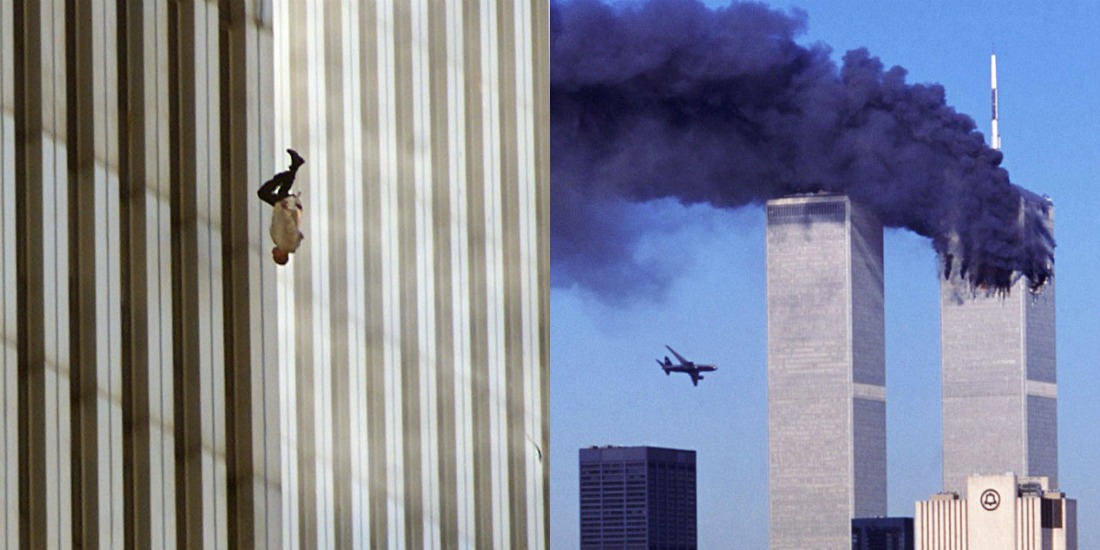The Big Picture -Â
By Glynn Wilson -Â
WASHINGTON, D.C. — I’m not a real fan of reliving sad, tragic moments on every anniversary like the rest of the news media in America, always desperate to attract attention and fill up space and time.
I had to turn off Scott Simon on NPR on Saturday morning, Sept. 11, 2021, because hearing speakers droning on about events 20 years ago and bagpipes playing was just too painful to relive. There is very real news to cover about what’s going on now, like keeping up with the legal fate of the Capitol insurrectionists from Jan. 6 2021.
Six More Plead Guilty for Role in Capitol Insurrection
But since we are charged with the mission to “Never Forget” 9/11, I guess it is incumbent upon me to write something on this 20th anniversary, for the record. I’ve already told a version of this story in my memoir.
Jump On The Bus: Make Democracy Work Again
But here are some of my memories and thoughts from that period in our history that literally changed the course of the world and my life, and not necessarily for the better.
On the morning of Sept. 11, 2001, I slept late in my glorious Uptown duplex apartment on Plum Street in New Orleans, because in the early morning hours after midnight, I had emailed a draft of my doctoral dissertation to the committee in Knoxville, Tennessee. I did not have an early morning class to teach that day at Loyola University, so I slept in a bit.
When I did get up around nine or so and cranked up my computer and got online, the first I heard of the planes crashing into the World Trade Center towers in New York came in an email from a student. He asked what we should make of this, and I didn’t know what to tell him because I had not seen it yet.
I ran in the front room and turned on the TV, flipping to CNN like everybody else that day, just in time to see the second United Airlines Flight 175 crash into the South Tower at 9:03 a.m.
I knew instantly that the world would be changed by this event, and that my world was about to be turned upside down by it as well.
The success of the attacks did change the course of history, and my unlucky timing of sending in the dissertation on that morning probably cost me a Ph.D. and a tenure track teaching job as a college professor. Of course the situation was more complicated than that. But can you imagine four university professors waking up and watching the footage of the attacks on CNN and then opening up a 350 page email attachment?
The stress got to everybody, and my email became a target of scorn that would set off a series of events that would ultimately lead me away from an academic future and back into the news business.
But I must say that semester of teaching was probably my best, mainly because all my students actually showed up for class every day and the news itself took on an air of importance it had not enjoyed in a number of years.
Prior to 9/11, the most notable news stories from the 1990s involved names like Michael Jackson, O.J. Simpson and Monica Lewinsky. The personal computer and internet revolutions had already begun transforming life everywhere, and the administration of Bill Clinton had actually solved a lot of problems, most notably the federal budget deficit. Remember the “Peace Dividend?” I guess you would have had to be there then, and paying attention.
From my perspective, it was the election of 2000 that really began screwing up the world, when Al Gore lost in the case of Bush v. Gore. I still do not believe Osama bin Laden would have been able to organize and pull off those attacks if George W. Bush had not been president. It’s too long and complicated a story to repeat here, but bin Laden’s brother had died in a helicopter crash in Texas working for the Bush family oil business. Osama blamed Bush.
Later, when Bush called for the invasion of Iraq, he too held a personal grudge against Saddam Hussein, for threatening to kill his father, former President George H.W. Bush.
So you can see how these personal vendettas can get us into trouble.
I wrote a piece about the attacks for the student newspaper at Loyola, but I don’t seem to have a copy of it handy. But like many opinion writers at the time, I remember acknowledging that the attacks would change the world, and not for the better.
My life did not completely fall apart, however. I ended up having the run of my life as a free-lance journalist for the next few years, ultimately publishing in The Nation magazine, The New York Times, The Christian Science Monitor and The Dallas Morning News, as well as Gambit Weekly in New Orleans and other publications. I even made a small fortune covering celebrity news for People magazine for awhile, invoicing in the online billing system for the old Time Inc.
In August the next year, right before the first anniversary of 9/11, I luckily found myself the only reporter in the room when Rudi Giuliani spoke at the Southern Governors Association conference at the Ritz Carlton Hotel on Canal Street. Of course Giulinai at that time was still considered “America’s Mayor” for his face time on TV in the aftermath of the attacks. Who knew he would turn out to be such a joke for his role as Donald Trump’s attorney?
Anyway, I broke the story that day through the old wire serve United Press International, which would become one of the first news casualties of the internet age.
Giuliani reveals thoughts on WTC site
In reading that story now, I am struck by the final paragraph.
“In a news conference after his presentation to the governors, Giuliani stopped short of supporting a military invasion of Iraq in the near future. But he said he supports the Bush administration’s plan to remove Saddam Hussein’s regime as ‘the only way we are going to make the world safe for the future. They aggressively sponsor terrorism and are clearly developing weapons of mass destruction.'”
That turned out to be a lie, and the war in Iraq caused far more death and destruction than the war in Afghanistan that just ended with a whimper.
I know that the impact of the attacks was felt more in New York City, especially by those with family members who died in the attacks and by the first responders who suffered health and psychological problems. But I was not in New York covering that story.
Like millions of other people, including those in Afghanistan and Iraq, even 1,300 miles away in New Orleans lives were impacted by the event.
But I would argue that just as many lives and maybe more were impacted by four years of Trump in the White House, and by the U.S. Capitol insurrection on Jan. 6, 2021.
I find myself wondering if 20 years from now, we will still be talking about this anniversary, and whether we will have learned anything from it.
One of the few stories I shared on Facebook on this day was a story by Serge Schmemann for The New York Times. I was struck by this line.
“Sept. 11 is also shorthand for the moment when America lost its way, especially with the war in Afghanistan having come to a tragic, ugly and senseless end. Many of the anniversary essays are about a legacy of misguided Middle Eastern wars, foreign policy failures, Islamophobia and confusion about America’s role in the world.”
I Wrote the Lead Times Article on 9/11. Here’s What Still Grips Me.
Read it for yourself if you can, and share if you care.
Where was Mark Zuckerberg on 9/11 and how was he affected by the attacks? I don’t see that story being shared on the world’s most popular social media platform.
___
If you support truth in reporting, and fearless writing, consider making a contribution today with GoFundMe or PayPal.














